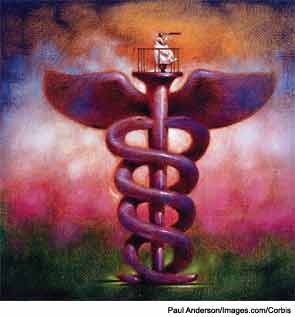
Explore This Issue
July 2013 “I do not think I deserved an “A” for every patient I treated, which was the basis for trying to improve my practice. This is the essence of MOC, which seems to be lost in the discussion.”
“I do not think I deserved an “A” for every patient I treated, which was the basis for trying to improve my practice. This is the essence of MOC, which seems to be lost in the discussion.”
—Robert H. Miller, MD, MBA
The American Board of Medical Specialties (ABMS) maintenance of certification (MOC) program was a hot topic of discussion at the recent American Medical Association House of Delegates meeting, which took place June 13-19 in Chicago. Several anti-
MOC motions were made, with some passing the House. It seems the basic issue for some doctors (but certainly not for all of the delegates) is that they do not want to do MOC. Some of the more vocal participants said they practice the latest medicine flawlessly and don’t need anyone to improve their practice or encourage lifelong learning, particularly the ABMS boards’ MOC program.
To me, perhaps the most notable quote from an MOC opponent was, “If I see 15 patients a day, that’s 15 tests a day. And I have to get an “A” on each one.” I presume this doctor is grading herself, which has just a few inherent flaws. I can honestly say that I do not think I deserved an “A” for every patient I treated, which was the basis for trying to improve my practice. This is the essence of MOC, which seems to be lost in the discussion.
Many of the delegates were very thoughtful in their concerns about MOC: “Does it work?”; “It is yet another expense?”—with some stating that MOC is just a way for the boards to make money. Another delegate added, “It takes time out of my practice when I could be seeing patients.”
I’d like to address each of these important questions.
1. Does It Work?
Although MOC has only been in existence since 2002, there is some evidence that MOC is effective. The ABMS website (abms.org) has information on studies of MOC. As more physicians participate in MOC and as the program itself is refined, more studies should and will be done to document what works and how to improve the system.
2. It’s Just a Way for the Boards to Make Money
The American Board of Otolaryngology (ABOto) has recently reduced the price of its MOC program to $310 a year, which covers all four components. The ABOto financial policy is that all of its products (tests, MOC, etc.) should cover their production and adminstration costs, with no intention of making a profit off any of the products. The MOC fees are currently not covering all of its expenses, a situation that will change as more diplomates participate. When this happens, a combination of a reduced fee and program improvements will be implemented.
Leave a Reply